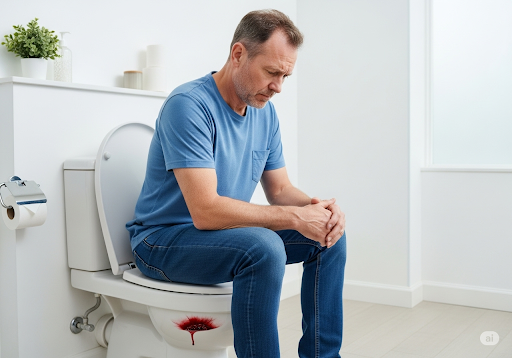Mr. James, 45, is a company executive. He is usually busy at work, eats irregularly, and occasionally suffers from constipation or diarrhea, but he never cares much. It wasn’t until half a year ago that he found his stool blackened and sometimes with dark red blood, which alerted him.
At first, thinking it was a hemorrhoid attack, he bought an ointment to apply on his own, but the symptoms did not go away. At his wife’s insistence, he goes to the hospital for a colonoscopy, which shocks him —— Early stage colon cancer!
The doctor told him that fortunately it was discovered early, the tumor had not spread, and the prognosis was good after surgical removal. If the delay continues, the consequences will be disastrous.
James’s experience is not unique. Early symptoms of bowel cancer are often not noticeable and easily overlooked, but changes in bowel habits and stool traits are often important early warning signs from the body.
Be careful about what abnormalities occur when you defecate
1. Blood or mucus in the stools
Blood in the stool is an important manifestation of bowel cancer, but many people will think it is hemorrhoids and don’t care.
The normal stool color is tan. If bright red bloody stools occur, it is likely that cancer cells damage the blood vessels in the intestines and cause intestinal bleeding. You should be wary of intestinal cancer.
Although hemorrhoids are mostly bright red in bleeding, they will not mix with feces when they drip down after being excreted.
And “bleeding caused by bowel cancer is often dark red or jam-colored, sometimes mixed in the stool, accompanied by mucus or pus that is difficult to flush clean and often sticks to the edge of the toilet”.
2. Sudden change in bowel habits
The regular bowel movements of healthy people are scheduled and fixed once a day, and they are in normal shape.
If the number of stools exceeds three times a day and is not organized, and diarrhea and constipation alternate, the number of defecations increases or decreases significantly, and there is still a urge to defecate after defecation, it may be caused by intestinal tumors irritating the intestinal mucosa, leading to intestinal dysfunction.
Vigilance should be increased and hospital check-ups should be carried out as soon as possible, as changing bowel habits are the most common manifestation of colorectal cancer.
3. Thin or abnormally shaped stools
Normal stool is a regular note, if the stool is elongated, flat and flaky, it is mostly caused by rectal tumors, anal or rectal stenosis, and rectal cancer; if the stool is thin pencil-shaped, it is mostly caused by anal fissures, hemorrhoids, intestinal spasms, rectal cancer, etc.
If this shape change continues to appear, further examination is required as soon as possible.
4. Long-term abdominal pain, bloating, not relieved after defecation
Intestinal tumors may block the intestinal tube, causing obstruction of stool passage, causing abdominal distension, abdominal pain, especially if abdominal pain is noticeable before defecation and relieved after defecation, which may be an early manifestation of intestinal obstruction.
Some patients also experience strenuous bowel movements, which are difficult to pass even if there is a strong urge to defecate, this is because the urge to defecate produced by tumor stimulation of the intestines is not a real accumulation of stool, but an abnormal sensation caused by tumor compression.
How to reduce bowel cancer risk?
1. Periodic screening
● It is recommended that people over 40 years old must have a colonoscopy. If there is no abnormality in the examination, subsequent examinations can be performed every 5~10 years;
● People with a family history of bowel cancer should be screened in advance.
2. Healthy eating
● The daily diet should be diversified;
● Eat more dietary fiber (vegetables, fruits, whole grains);
● Reduce intake of red meat, processed meat products (such as sausages, bacon).
3. Keeps in motion
Sedentary periods can increase the risk of bowel cancer, and exercising for 30 minutes a day can help your bowel health.
4. Quit smoking and limit alcohol
Smoking and excessive alcohol consumption are both high-risk factors for bowel cancer.
Disclaimer: The images shown in the article are all
AI-generated. If these pictures have copyright issues or are not suitable for
commercial use, we will strictly abide by the relevant laws and regulations.
Once pointed out, the relevant pictures will be deleted immediately. Thank you
for your understanding and cooperation!


